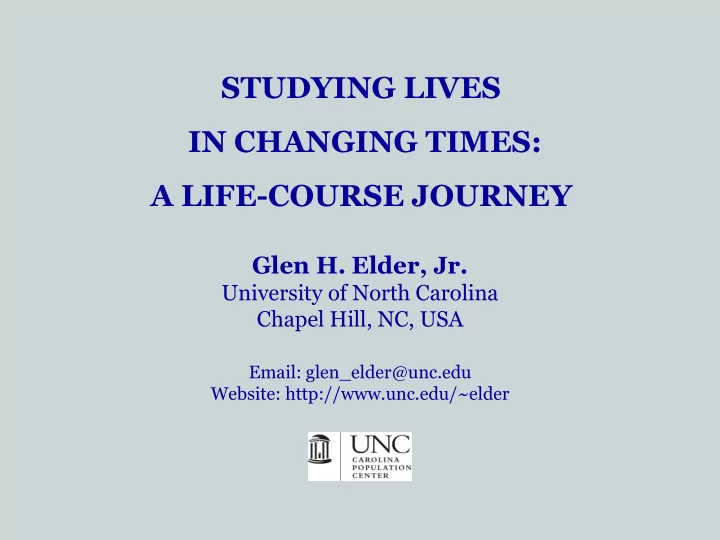

STUDYING LIVES IN CHANGING TIMES: A LIFE-COURSE JOURNEY Glen H. Elder, Jr. University of North Carolina Chapel Hill, NC, USA Email: glen_elder@unc.edu Website: http://www.unc.edu/~elder
Formative Early Themes Social Change Parental In Influences Life Experience College & Graduate School The Berkeley Years
Mother’s Life & Biographical Perspective 1905- 1998 / Urban Child / Married in ‘32 / 2 sons • Worklife – English literature teacher, H.S.; Girls’ basketball coach • Community – leadership in fine arts, church • Avid reader of historical biographies
Father’s Influence: Doing Big Things 1901-63 / Farm Childhood / College graduate • Career sequence: coach medical career farmer • Thrived on doing “innovative things” • Agentic role model
Life-Shaping Changes 1949 – Family move to Pennsylvania farm 1941-45 1934 Birth of World War II, Glen Elder War & Homefront 1929-41 The Great Depression (Cleveland, Ohio)
Higher Education And Life Transitions 1. To Penn State – From Agriculture to Social Psychology (1952-57) 2. Dean of Men’s Staff, Kent State University (1957-58) 3. MA Thesis, Kent State – on “Transition to College.” Used “recalled events, influences.”
A Carolina Ph.D. and Serendipity • Thinking of “young lives” while using survey data. • Exposure to developmental study monographs in UNC library. • Meeting new Berkeley Institute Director John Clausen, who offered a job at Berkeley.
Studying People Over Time – The Berkeley Experience • Oakland Growth, Ss born 1920-21, N=185. Director, Harold Jones. • Berkeley Study, Ss born 1928-29, N=212. • Both studies were collecting data by 1930-31. Main Gate – University of California-Berkeley
Discovering the Oakland Archives • Data collection – parent interviews, peer and staff observations, Ss reports. • Serendipity again! Evidence of “ongoing family change” – from 1929 to 1933 income. • Qualitative data materials. Enabled “recoding.” Can address new questions!
Thinking About Lives • Variation in timing and effect of life events and social roles – psychologist B. Neugarten, 1950s. Life cycle of generations and socialization. • Birth cohorts as a population perspective on social change and life patterns – demographer Norm Ryder (1965). • A survey codebook on pathways – through life, work, family, leisure. Saw how lives might be represented.
What Perspective? The Life Course Framework: Its Research Traditions, 1960s Person Life Context Life-span Concepts Social Roles and Age and of Development Relationships Temporality An Interdisciplinary Theoretical Orientation
Linking Career to Emerging Field ─ Life Course Studies ─ • Career – Studying Lives in Changing Times, 1962 - . • 1 st job at UC- Berkeley (‘62) on studies of people over time. • Emerging field of longitudinal and life course studies.
Approach for Study — from Children of the Great Depression , 1974, 1999 Economic collapse, followed by decline in MC and WC families, 1929-33 Family response to hardship New social roles Coping with Emotional scarcity strain Influence on children and their adult lives
Adding Another Cohort: Oakland & Berkeley 1920 1930 1940 1950 Oakland $ Cohort Income H.S. Loss Graduate Depression World War II Berkeley $ Cohort Income H.S. Loss Graduate
A Decade in the Making: “Children of the Great Depression” 1964-65 Initial work – lengthy report to Institute Director 1966-67 First draft 1966-71 Research papers 1972 Used findings in draft 2 1972-73 1-yr. sabbatical at Institute to prepare data for cohort comparison 1974 Publication of book 25 th anniversary volume with cohort comparison 1999
What I Learned from “Children” • A resilient generation – not a “lost generation.” Explanations: Life stage and the “timely” Depression, military service, and postwar prosperity. • Reinforced traditional gender roles. • Values – importance of family, centrality of hard work, thrift.
Discovering the Life Course, 1970s: Demography, History, and Life-span Psychology • Historical demography – The Cambridge Group, Households and Family in Past Time , 1972. • Social historians of the life course – Tamara K. Hareven, Transitions , 1978. • SSRC Committee (USA) – Life course and human development, 1977-1986 – Paul Baltes, Max Planck Institute, et al.
Conceptual Advances ― 1980s: The Long and Short View of Lives The Long View: Social pathways Trajectories, social and developmental Turning point in a trajectory The Short View: Social transitions and mechanisms – control cycles, situational imperatives, and accentuation dynamics
The Perspective from: North America vs. Europe • North America – focus on individual in context. • Europe and an institutional perspective, welfare state. ▫ Emerged later in the 1970s, 1980s. • Converging perspectives – U.S. Manpower policy in WWII and its effects on men’s lives.
Studies of Changing Times in Lives: Research Continuities Great Depression Project: Oakland-Berkeley Samples Impact of Rural-Urban Change Impact of WWII • Iowa Youth & Family Study • Stanford-Terman sample • Philadelphia Inner-City • Oakland-Berkeley sample Study • Harvard Graduate sample
Mapping the Life Course: Paradigmatic Principles, 1993 Human Development and Aging as Life-Long Process Human Linked Agency in Lives Constrained Situations Lives in Timing in Time and Lives Place
Life Course Paradigm from “Children” • Age and time – historical, social, biological. • Linkages – lives in context: crossing levels of analysis; families and relationships. • “Recasting” longitudinal data to address new questions.
Ecological and Life Course Models • Bringing ecology to cohort analysis. • Neighborhoods and their surround (Externality). • The Life Course, role and residential sequences.
Opportunities for the Future • Taking advantage of comparable longitudinal data – Global options. • Relating early experiences and late life. • Investigating mechanisms. • Integrating ecological and temporal perspectives.
LIFE COURSE PUBLICATION TREND Source: Web of Science Citation Report. September 19, 2011. N=5,023.
Thank you The Old Well, University of North Carolina – Chapel Hill
Recommend
More recommend